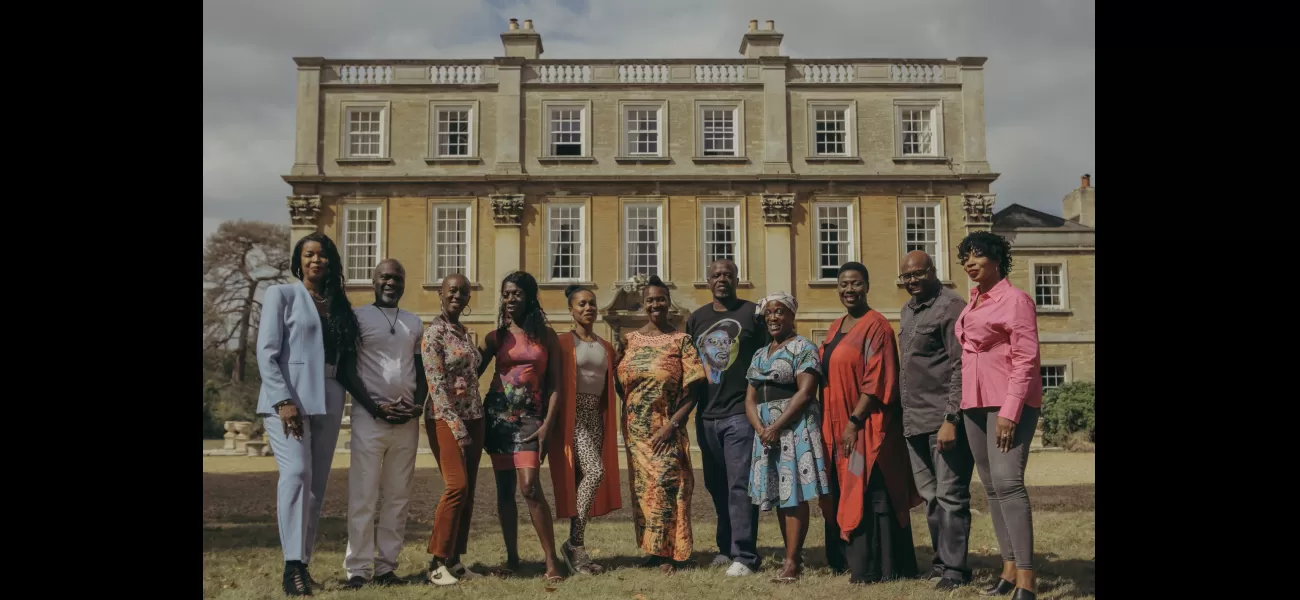70,000 Black children in Britain were sent to live with white families as part of a secret "farming" system.
Many still struggle with trauma from having their identity questioned by being moved around.
October 4th 2023.

Documentary White Nanny Black Child, explores the story of unregulated fostering of Black babies and children into white families across the UK
Remi is one of tens of thousands Nigerian children who were privately fostered by white families in the four decades since 1955, in a controversial practice known as ‘farming’. This phenomenon is heavily undocumented; a secret that Britain has buried and failed to deal with.
But Remi is now telling her story as part of a new film, White Nanny Black Child, which explores the story of unregulated fostering of Black babies and children into white families across the UK.
Remi’s challenging childhood was spent being passed to and fro between foster carers and her biological parents. Taken in by a British family at six weeks old, her formative years were difficult and disjointed. She recalls her foster mother having an argument with her biological parents about who would pay for the upkeep, and she was terrified she’d be taken away.
Remi remembers screaming and crying; ‘I just knew that I was being taken away from my mummy’, before being placed with another foster family, who didn’t know how to look after her. She adds that she was ‘unhappy all the time’ before being taken to live with her biological family in Nigeria as a teen, where, miserable, she completely shut down. A year later, her parents moved her back in with her original foster family.
Nine Nigerian-born people who were taken in by white families have told their stories as part of the documentary. Their experiences vary wildly; many were loved, some neglected and others abused. But however well they were treated in the home, they all shared a feeling of loss and confusion or faced racism, isolation and discrimination in public.
The film, directed by Andy Mundy Castle, explores how these adults have been affected, taking it in turns to explore their past with the help of professional therapy. It was a tough time for Black children growing up in postwar Britain. Landlords would post signs: ‘No coloured, no dogs, no Irish.’ Racial slurs were shouted in the streets and Enoch Powell made his infamous ‘rivers of blood’ speech, decrying immigration. Nigerian families, who had come to the UK on the promise of work and education, found a cold, grey and unwelcoming land.
More than 70,000 West African children were fostered unofficially by white British families between 1955 and 1995 as their parents studied and worked to give their children a better life. Families looking for help would post in publications like Nursery World, sometimes with pictures or captions. One listing from 1974 read: ‘Pretty baby girl needs a new home.’
Sixty years on, these babies now grown are telling their stories. One of them, Ade, tells The Agency that his early experiences affected him for the rest of his life. He was taken on by a nanny at two months old while his mother – with no family nearby to help – studied to be a midwife. His parents spotted an advert in a New Cross newsagent, posted by a white woman called Pat. Desperate for childcare after Ade’s first placement went awry they agreed a price and Ade was sent to live with her by the seaside. Pat became ‘Hastings Mum’ and every weekend his parents would visit, or he would see his ‘London Mum and Dad’.
In general, he had a good experience of the fostering process. But Ade spent the majority of his adult life moving between Britain, Nigeria and America as he struggled to find a place to call home. Ade had made peace with the process after talking it through with his dad, who has since passed away. But he says: ‘I always felt like I didn’t know where I belonged. Even the love and connection with my mother wasn’t as strong. I wanted and craved affection. The back-and-forth experience left me with the struggle of – was I Nigerian enough? I felt like I didn’t fit in. There was a sense of displacement, I couldn’t explain it but I didn’t feel grounded anywhere.’
Before his father’s death, Ade came to understand his parents’ decision, adding: ‘During that time, it was just what people did. They came over here for a better life. The UK gave an impression that there was a connection with Nigeria. And when they got here, they had to work and there was nobody to watch their child.
The placements left a generation of children bereft of community and confused about their identity, with many of them still grappling with residual trauma still today. Seal, Kris Akabussi, Florence Olajide, Gina Yashere, Nelson Abbey, Adewale Akinnuoye-Agbaje, John Fashanu and Justin Fashanu were all privately fostered, and many of those that lived through this contentious unofficial policy have had to live with its impact for decades.
White Nanny Black Child shines a light on the lives of those affected by this largely forgotten policy, in a bid to understand the lasting effects it has had on these adults. It is an important reminder of a dark chapter in Britain’s history – one that cannot be forgotten.
Documentary White Nanny Black Child explores the story of unregulated fostering of Black babies and children into white families across the UK. Remi is one of tens of thousands of Nigerian children who experienced this practice, known as ‘farming’. It left a generation of children bereft of community and confused about their identity, still grappling with the trauma today.
Seal, Kris Akabussi, Florence Olajide, Gina Yashere, Nelson Abbey, Adewale Akinnuoye-Agbaje, John Fashanu and Justin Fashanu were all privately fostered, and many of those that lived through this contentious unofficial policy have had to live with its impact for decades.
Remi’s story is one of fear, insecurity and lack of agency. Taken in by a British family at six weeks old, her formative years were challenging and disjointed. She remembers her foster mother arguing with her biological parents about who would pay for her upkeep, leaving her terrified she’d be taken away. After being placed with another foster family, she was ‘unhappy all the time’. When her parents moved her back with her original foster family, she completely shut down.
Nine Nigerian-born people who were taken in by white families have told their stories in the documentary. While some were loved and some neglected, they all shared a feeling of loss and confusion, or faced racism, isolation and discrimination in public.
The phenomenon is heavily undocumented, a secret that Britain has buried and failed to deal with. The film, directed by Andy Mundy Castle, explores how these adults have been affected, taking it in turns to explore their past with the help of professional therapy.
More than 70,000 West African children were fostered unofficially by white British families between 1955 and 1995. Families looking for help would post in publications like Nursery World, sometimes with pictures or captions. One listing from 1974 read: ‘Pretty baby girl needs a new home.’
Ade was taken on by a nanny at two months old while his mother studied to be a midwife. His parents spotted an advert in a New Cross newsagent, posted by a white woman called Pat. He had a good experience of the fostering process, but would spend the majority of his adult life moving between Britain, Nigeria, and America as he struggled to find a place to call home.
After talking it through with his dad, Ade came to understand his parents’ decision. He says: ‘During that time, it was just what people did. They came over here for a better life. The UK gave an impression that there was a connection with Nigeria. And when they got here, they had to work and there was nobody to watch their child.’
White Nanny Black Child shines a light on the untold stories of this generation of children, bringing to the fore the complexity of the situation and the impact it had on the lives of those affected. The documentary is an important reminder that the human cost of this policy has been felt for decades, and is still being felt today.
Remi is one of tens of thousands Nigerian children who were privately fostered by white families in the four decades since 1955, in a controversial practice known as ‘farming’. This phenomenon is heavily undocumented; a secret that Britain has buried and failed to deal with.
But Remi is now telling her story as part of a new film, White Nanny Black Child, which explores the story of unregulated fostering of Black babies and children into white families across the UK.
Remi’s challenging childhood was spent being passed to and fro between foster carers and her biological parents. Taken in by a British family at six weeks old, her formative years were difficult and disjointed. She recalls her foster mother having an argument with her biological parents about who would pay for the upkeep, and she was terrified she’d be taken away.
Remi remembers screaming and crying; ‘I just knew that I was being taken away from my mummy’, before being placed with another foster family, who didn’t know how to look after her. She adds that she was ‘unhappy all the time’ before being taken to live with her biological family in Nigeria as a teen, where, miserable, she completely shut down. A year later, her parents moved her back in with her original foster family.
Nine Nigerian-born people who were taken in by white families have told their stories as part of the documentary. Their experiences vary wildly; many were loved, some neglected and others abused. But however well they were treated in the home, they all shared a feeling of loss and confusion or faced racism, isolation and discrimination in public.
The film, directed by Andy Mundy Castle, explores how these adults have been affected, taking it in turns to explore their past with the help of professional therapy. It was a tough time for Black children growing up in postwar Britain. Landlords would post signs: ‘No coloured, no dogs, no Irish.’ Racial slurs were shouted in the streets and Enoch Powell made his infamous ‘rivers of blood’ speech, decrying immigration. Nigerian families, who had come to the UK on the promise of work and education, found a cold, grey and unwelcoming land.
More than 70,000 West African children were fostered unofficially by white British families between 1955 and 1995 as their parents studied and worked to give their children a better life. Families looking for help would post in publications like Nursery World, sometimes with pictures or captions. One listing from 1974 read: ‘Pretty baby girl needs a new home.’
Sixty years on, these babies now grown are telling their stories. One of them, Ade, tells The Agency that his early experiences affected him for the rest of his life. He was taken on by a nanny at two months old while his mother – with no family nearby to help – studied to be a midwife. His parents spotted an advert in a New Cross newsagent, posted by a white woman called Pat. Desperate for childcare after Ade’s first placement went awry they agreed a price and Ade was sent to live with her by the seaside. Pat became ‘Hastings Mum’ and every weekend his parents would visit, or he would see his ‘London Mum and Dad’.
In general, he had a good experience of the fostering process. But Ade spent the majority of his adult life moving between Britain, Nigeria and America as he struggled to find a place to call home. Ade had made peace with the process after talking it through with his dad, who has since passed away. But he says: ‘I always felt like I didn’t know where I belonged. Even the love and connection with my mother wasn’t as strong. I wanted and craved affection. The back-and-forth experience left me with the struggle of – was I Nigerian enough? I felt like I didn’t fit in. There was a sense of displacement, I couldn’t explain it but I didn’t feel grounded anywhere.’
Before his father’s death, Ade came to understand his parents’ decision, adding: ‘During that time, it was just what people did. They came over here for a better life. The UK gave an impression that there was a connection with Nigeria. And when they got here, they had to work and there was nobody to watch their child.
The placements left a generation of children bereft of community and confused about their identity, with many of them still grappling with residual trauma still today. Seal, Kris Akabussi, Florence Olajide, Gina Yashere, Nelson Abbey, Adewale Akinnuoye-Agbaje, John Fashanu and Justin Fashanu were all privately fostered, and many of those that lived through this contentious unofficial policy have had to live with its impact for decades.
White Nanny Black Child shines a light on the lives of those affected by this largely forgotten policy, in a bid to understand the lasting effects it has had on these adults. It is an important reminder of a dark chapter in Britain’s history – one that cannot be forgotten.
Documentary White Nanny Black Child explores the story of unregulated fostering of Black babies and children into white families across the UK. Remi is one of tens of thousands of Nigerian children who experienced this practice, known as ‘farming’. It left a generation of children bereft of community and confused about their identity, still grappling with the trauma today.
Seal, Kris Akabussi, Florence Olajide, Gina Yashere, Nelson Abbey, Adewale Akinnuoye-Agbaje, John Fashanu and Justin Fashanu were all privately fostered, and many of those that lived through this contentious unofficial policy have had to live with its impact for decades.
Remi’s story is one of fear, insecurity and lack of agency. Taken in by a British family at six weeks old, her formative years were challenging and disjointed. She remembers her foster mother arguing with her biological parents about who would pay for her upkeep, leaving her terrified she’d be taken away. After being placed with another foster family, she was ‘unhappy all the time’. When her parents moved her back with her original foster family, she completely shut down.
Nine Nigerian-born people who were taken in by white families have told their stories in the documentary. While some were loved and some neglected, they all shared a feeling of loss and confusion, or faced racism, isolation and discrimination in public.
The phenomenon is heavily undocumented, a secret that Britain has buried and failed to deal with. The film, directed by Andy Mundy Castle, explores how these adults have been affected, taking it in turns to explore their past with the help of professional therapy.
More than 70,000 West African children were fostered unofficially by white British families between 1955 and 1995. Families looking for help would post in publications like Nursery World, sometimes with pictures or captions. One listing from 1974 read: ‘Pretty baby girl needs a new home.’
Ade was taken on by a nanny at two months old while his mother studied to be a midwife. His parents spotted an advert in a New Cross newsagent, posted by a white woman called Pat. He had a good experience of the fostering process, but would spend the majority of his adult life moving between Britain, Nigeria, and America as he struggled to find a place to call home.
After talking it through with his dad, Ade came to understand his parents’ decision. He says: ‘During that time, it was just what people did. They came over here for a better life. The UK gave an impression that there was a connection with Nigeria. And when they got here, they had to work and there was nobody to watch their child.’
White Nanny Black Child shines a light on the untold stories of this generation of children, bringing to the fore the complexity of the situation and the impact it had on the lives of those affected. The documentary is an important reminder that the human cost of this policy has been felt for decades, and is still being felt today.
[This article has been trending online recently and has been generated with AI. Your feed is customized.]
[Generative AI is experimental.]
0
0
Submit Comment





